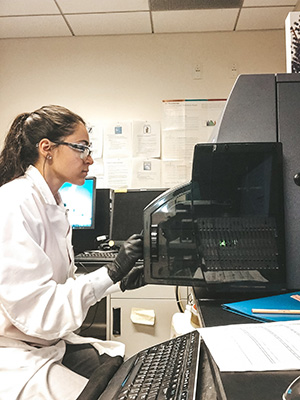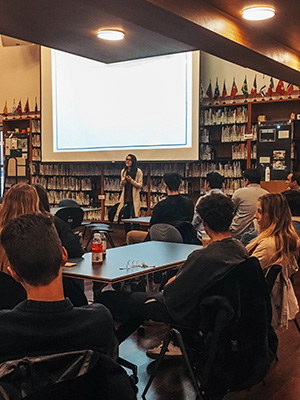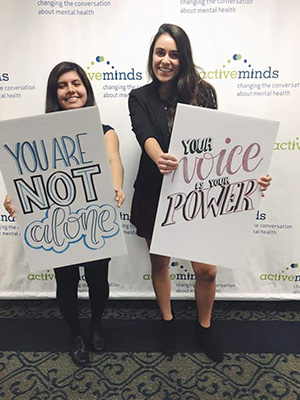Bio Grad Takes on Mental Health Stigma and Medicine
By Kylie Gray
September 23, 2019
On co-op at Johnson & Johnson, Deanna Mauro ’19, stood confidently before a room of senior scientists. Mauro, then a junior biological sciences major, had spent the last six months running her own project, designed to increase the effectiveness of a specific immunotherapy.

She was one of only three researchers chosen to present their projects to the entire oncology division — a first for a Drexel co-op student.
“I was adamant that I wanted a platform to share what I was doing,” she says. “It was intimidating, but very rewarding, to be the only student in the room. I kept reminding myself that no one knew the project better than I did.”
That day wasn't the first time Mauro recognized the power of an audience. For the last three years — when she wasn't running experiments or learning biology techniques — she was taking on the stigma surrounding mental illness as a professional public speaker.
Finding Her Voice
It all started when Mauro’s therapist, who speaks throughout the region, invited Mauro to share her story about overcoming an eating disorder.
“It was five hours of back-to-back classes of sixth graders,” she says. “I was absolutely terrified — but the students’ engagement, their questions, showed how much the topic meant to them. We don’t talk enough about mental health, and I felt like I had something to say.”

Mauro accompanied her therapist on several more speaking engagements, and was soon hired independently as a speaker. She has since addressed mental health topics with a range of audiences — from discussing coping skills with elementary students to providing the patient perspective to the University of Pennsylvania’s nurse practitioner program.
She will often spend the day presenting to every student in a school, and then to their parents, with the goal of sparking family conversations.
“I start by telling the students a little about myself — how I had depression from a young age, which manifested into an eating disorder in high school; how I learned coping skills; and why I am talking to them today,” she says.
“I share what I wish I had known at their age. I focus on the initial step of getting help: What would have been the one thing to make me go talk to someone? If it had been me in their shoes, I would have heard ‘It’s not just me. I’m not alone in this.’ I don’t think you realize that until it’s vocalized.”
Her Ambition Can’t Wait
Mauro was determined to bring her mental health advocacy to Drexel when she applied as a pre-junior and transfer student from community college. With only three years to spend at Drexel, she hit the ground running, and immediately got involved in Active Minds at Drexel. The peer-to-peer organization focuses on mental health awareness and co-hosts student events such as Puppy Pawlooza, De-stress Week and Eating Disorder Awareness Week.

“We talked about our experiences and advocated in the Drexel community, trying to break down the stigma on a larger scale,” she says. “They may not have realized it, but many students shared the same stories: the struggles of being an international student, keeping up in a fast-paced environment, having no time to wind down and de-stress. We tried to tailor the club toward these concerns.”
Finding her community in the club and in the biology department, Mauro also wasted no time pursuing her professional and educational development. Having worked as a nurse’s aid for two years, she knew that she wanted to explore the scientific side of medicine and eventually become a doctor.
With the help of her TA, the then first-year Drexel student crafted an email to Aleister Saunders, PhD, senior vice provost for research, summarizing what she found interesting about his biology research. Her initiative paid off when he invited her to conduct research in his lab, working on a drug for Alzheimer’s disease. She credits this experience with helping her land the competitive Johnson & Johnson co-op.
Mental Health Resources for Drexel Students
Tap into some of Drexel’s resources aimed at student mental health.
“I did a lot of cell culturing, running Western blots, and eventually running the experiments,” she says. “I had learned about these topics in class, but to be responsible for a living cell that came from a person — it made me all the more interested in research.”
The recent Drexel grad says she hopes to stay involved in disease research, especially where society “would really benefit from a cure.” She is currently awaiting responses from medical schools, and will continue speaking about mental health no matter where she ends up.
While her interests in biology and mental health may have began as separate entities, she has since come to see the commonalities that bind her two passions.
“Many people don’t understand the biology of mental illness,” she says. “You can learn the statistics about how many people it affects, but when you’re standing in front of a room full of students, the need for that education becomes so apparent.”
Advice from Deanna
“Learn to have grit and don't limit yourself, despite what anyone tells you that you can't achieve! What I think made me successful in college is that I kept my long-term goal in mind and pushed through any bumps in the road. While the path wasn't always linear, being resilient and figuring out the next best step made me a better student and stronger person in the end. College is a great time to find your passion and dive headfirst into anything that brings it out. Be willing to be flexible yet focused, and your time at Drexel will be filled with rewarding experiences.”